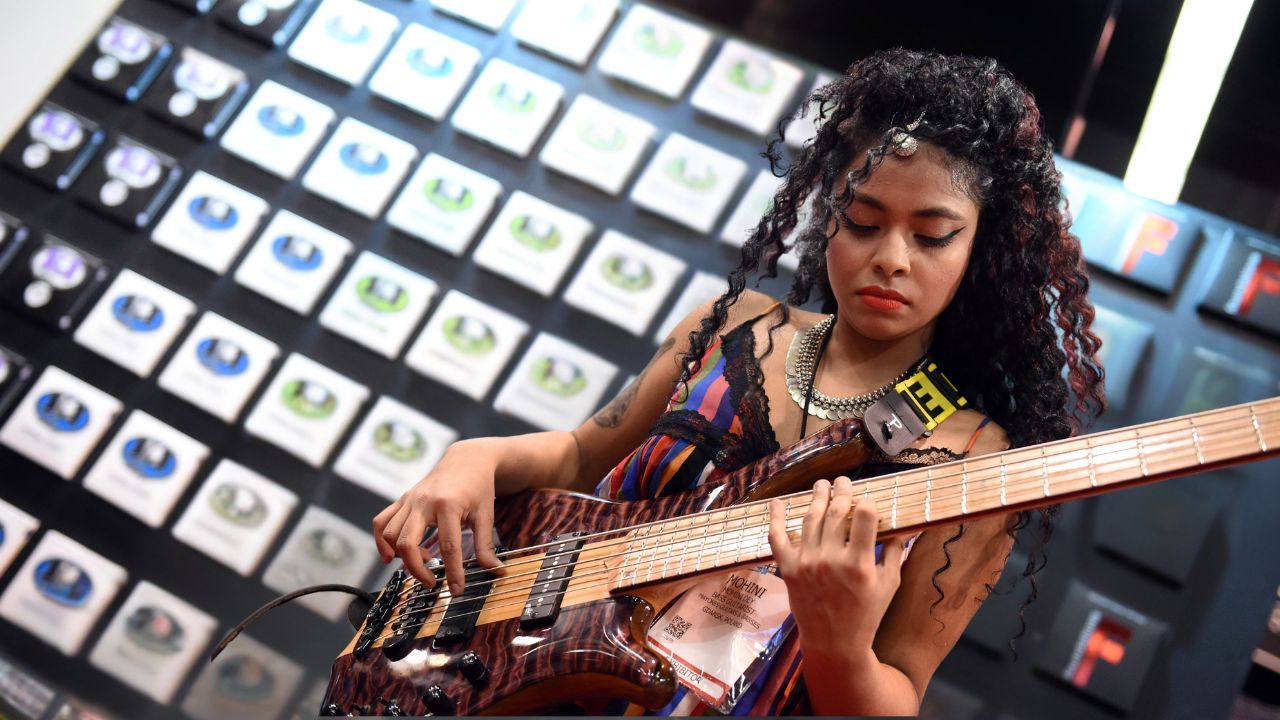
If you ever stop to wonder how a world-class musician stays at the top of their game for so long, then look no further than 5-string bassist Mohini Dey.
At the time of this interview Dey’s about to head to Europe to perform a series of concerts with Swiss guitarist Jill Yan, while also promoting a new album with prog-rock supergroup DarWin. Oh yeah, and she’s producing her own album as well, not to mention a recent stint with Willow Smith opening for Coldplay.
“I’ve been touring with Willow, and I’ve also been touring with my own band,” says Dey. She explains it’s down to “a lot of homework I have to keep up with” that she’s able to handle all the demands of each ensemble.
“I'm also doing a lot of recording sessions on the side, and I’m in the mixing and mastering stage for my second album. I guess I’m just hyperfunctional like that.”

With a fast-tracked career into music – from a humble upbringing in India to playing on some of the world’s biggest stages, as well as collaborating with superstars including Steve Vai, Greg Howe, Simon Philips (appearing on the superb new Distorted Mirror album) and Zakir Hussain among many others – Dey has an enviable résumé at the age of 29.
Yet for all her session experience, it’s now as a bandleader in her own right that she looks set to make her most personal musical statement to date.
“I’ve played in so many bands where I’ve been asked to play in a certain way, but when I started to write my own music, that’s when people really saw what I’m capable of. Luckily for me, people are ready for some more of that.”
Dey also sounds a note of caution to anyone who thinks they have reached their peak and have nothing left to learn: “I never thought I’d get hired by a pop band. Opening for Coldplay was never a career goal! I just never thought I’d be hired for a gig like that because of the way I play.
“But sometimes life can just hit you. You might be so focused on your own path that you’re not always prepared for when the universe is ready to give some of that energy back.”
You have quite a resume. Tell us how it all started.
“Initially I didn't have many goals. I just had one! Which was to move out of my parents’ house and be independent. I ended up getting my own place when I was 17. I was already playing with some of the biggest pop bands in India, but then I started working with a more international artists, and I realized I didn’t have to stay in India. I ended up moving to Nashville, and I got the gig with Willow Smith soon after that.”
How did you get the gig?
“Her management told me that she was a big fan of my bass playing and that she wanted me in her band. I hadn't heard much of her music at that point. I had heard Whip My Hair, and Wait a Minute, but those releases were from when she was a lot younger. She’s been through such a huge transformation in the last few years from Coping Mechanism to Empathogen. She's a totally different personality now.”
What happened next?
“I asked her management if I could listen to some of her new music. I wanted to know what I was letting myself in for! But also to make sure they were making the right choice by hiring me. I was already touring with my band and I didn’t want that to take a backseat. But when I heard her music I could totally hear myself in that setup, so I accepted the offer, and that’s how I got the gig.
“The Tiny Desk concert was my first gig with her. I never would've thought I’d land on a Tiny Desk with Willow Smith, and then we played Jimmy Fallon!”
Have you ever felt pigeonholed or labelled?
“I think people see me as someone who can tick a lot of of boxes. I’ve played in metal bands, jazz bands, and pop bands. I’ve played reggae and Brazilian music. Willow just lets me be who I am, and that’s the most important thing. If I was in a band where I felt restricted, then I just wouldn’t do it.”
You also toured with guitarist Greg Howe last year.
“I was out with Greg for two months. I grew up listening to Greg on albums like Extraction, which also features Victor Wooten and Dennis Chambers. I couldn’t wait to play some of those Victor Wooten basslines live!”
What other bassists have influenced you over the years?
“Players like Michael Manring, Gary Willis, Adam Nitti, and Victor Bailey. I was always a big fan of Jaco’s bass tone. Later on I got into gospel players like Sharay Reed, and that’s when I started trying to mix the tight attack of Jaco’s playing with the P-Bass tone of someone like Sharay. It was important for me to have a sound that would work with slap bass as well.”
Was it ever a challenge for you to develop your technical prowess?
“I think I’ve always been a very technical bass player. I was always intrigued and fascinated by the intricacy of technique, which led to my discovery of the different tones that are available from different playing techniques. That’s when I started to develop my own signature way of playing.
“Growing up in India I learned a lot of traditional carnatic music. I learned Raagas, and konnakol, and so I became comfortable with polyrhythms at a very young age. Metric modulation is another thing that’s taught in India. And so I'd construct exercises that allowed me to replicate tabla patterns on the bass.
“But it wasn’t until I started slapping that I realised I have a lot more in my vocabulary than I thought. That's when I consciously started to train myself to be more percussive.”
When did you start making YouTube videos?
“My channel really came out of a need to document my journey. It’s really inspiring to look back and see how far my bass playing has come. I still feel I'm the same person, but really I'm a completely different player. I also like looking back into the archives and seeing if there are any tricks that I could bring back!”







